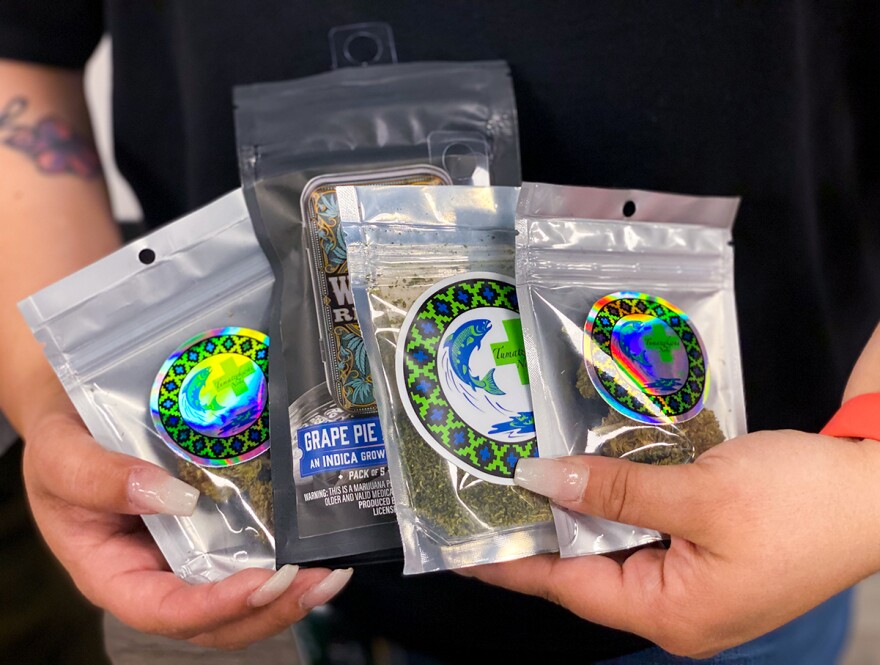The Walker River Paiute Reservation is situated in remote western Nevada, surrounded by a sequence of mountains layered with shades of brown, red and green. In the middle of it, up a long dirt road, sits the Weber Reservoir, near the town of Schurz. At the moment, it’s very quiet, and that’s because it’s closed to non-tribal citizens.
“I love it,” said tribal member Kylie Torres. “Because usually, especially when it’s warm, you have random people from God knows where here, and they’ll ride their quads and their RZRs, and they’re just reckless.”
The reservoir is the most popular recreational attraction on the reservation, but it’s been off-limits to the general public since last year. Tribes across the Mountain West chose to close their land early on in the pandemic, including the Walker River Paiute Tribe.
Officials here say that helped keep COVID-19 at bay. But there was an unexpected benefit, too: Closing the reservation has meant tribal citizens have Weber Reservoir to themselves.
Bella Torres, a member of the Walker River Paiute Tribe, is noticing how clean the land is.
“It’s better – there’s been less littering,” Bella Torres said.
Tidudzi Hoferer, another tribal member, observed how peaceful it’s been.
“You could hear the families laughing around the fires, and it was nice,” he said.
Tribal Chairman Amber Torres says it’s been wonderful.
“I think our people really enjoy having their homelands back because they can go out to the reservoir uninterrupted,” Amber Torres said. “They have their ancestral homelands back to go swimming and fishing, spending time with their own families.”

But some who don’t live on the reservation weren’t pleased with the decision to close Weber Reservoir to non-citizens. When the tribe put up signs and barriers, Amber Torres was disheartened by the response.
“Our signs were shot,” she said. “They were ran over, they were burned.”
Every day, Amber Torres says, the tribe gets calls from people wanting to know when Weber Reservoir will open, more so as temperatures climb. Before the pandemic, on the weekends, the reservoirs' six beaches were normally full with visitors from out of town. The general public was welcome as long as they bought camping and fishing permits.
Those permits are also a major source of revenue for the tribe. Amber Torres says her community has missed out on those dollars since March 2020.
“Having that shutdown since March has had a huge impact on the reservation as well,” she said.
Across the Mountain West, tribes have suffered similar economic losses throughout the pandemic. The Blackfeet Nation in Montana closed its entrance to Glacier National Park. Other tribes were forced to shut down casinos.
But Hoferer, for one, says closing Weber Reservoir was worth it.
“It was just family out there and it was the most awesome thing I’ve seen,” Hoferer said.
Hoferer would like for that to continue, in one way or another.
“I know we need the camping — the permits and the money that comes with that. But I think a certain time of year, maybe a week or something, where it’s just devoted to the community for them to enjoy just themselves, that would be nice,” Hoferer said.
As the reservoir has been closed, a new economic opportunity opened up on the reservation: a cannabis dispensary.
“The name is Tumatzekwae Nobe, meaning the helping home,” Amber Torres said.

The dispensary sits along a main highway, and Amber Torres says business is already strong.
“I think with the opening of our new tribal dispensary that will definitely offset some of the [economic] loss of keeping the reservoir closed,” she said. Her goal, and that of many tribal citizens, is economic sustainability and self-sufficiency. The dispensary and reservoir are part of that.
As for this summer, the tribe will come together in the next couple of weeks to decide if it will open Weber Reservoir back up to the public. In the meantime, it remains closed, giving tribal members more time to experience, in one small way, their ancestral lands in solitude.
This story was produced by the Mountain West News Bureau, a collaboration between Wyoming Public Media, Boise State Public Radio in Idaho, KUNR in Nevada, the O'Connor Center for the Rocky Mountain West in Montana, KUNC in Colorado, KUNM in New Mexico, with support from affiliate stations across the region. Funding for the Mountain West News Bureau is provided in part by the Corporation for Public Broadcasting.






